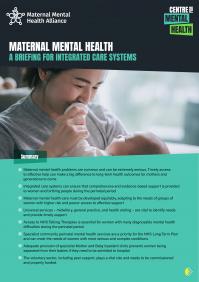One woman in five experiences a mental health problem during pregnancy or after they have given birth. Maternal mental health difficulties can have serious and lasting effects on the health and wellbeing of their baby. They also cost £8.1 billion annually in England: equivalent to £190 million for an average-sized integrated care system.
This is neither inevitable nor irreversible. With the right systems of support in place, maternal mental health difficulties can be prevented, and help offered quickly can reduce the risk of escalation and support recovery. Integrated care systems (ICSs) have a unique opportunity to ensure that all women who need support for their mental health during the perinatal period get the right level of help at the right time, close to home.
There are significant inequalities in the risks women face to their mental health. Getting quality care can be especially difficult for some mothers, including people from racialised communities, LGBTQ+ parents, people living in poverty, and neurodiverse and disabled people. Integrated care boards and partnerships can provide leadership to ensure that provision for maternal mental health is equitable for the whole population. This means proactively ensuring that groups of women whose needs are less well met by existing services are provided with effective support.
This briefing, commissioned by the Maternal Mental Health Alliance, sets out what integrated care systems can do to support maternal mental health, and provide equitable access to mental health care for all mothers and birthing people during the perinatal period.
Through investing in the workforce, ensuring a full range of psychological interventions are available to mothers locally, sustainably funding VCS services, and providing timely baby loss support, ICSs can prevent maternal mental illness, reduce the risk of escalation, and address the barriers for women facing systemic inequality.





